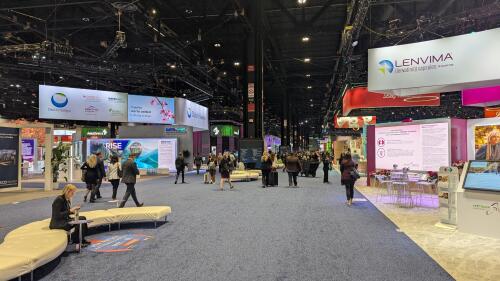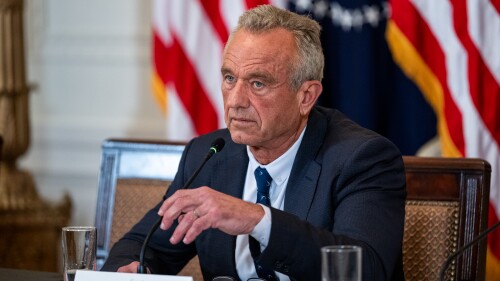The company is dropping its social anxiety disorder program but will still test the molecule in post-traumatic stress disorder.
The company’s technology, a modified herpes simplex virus used to deliver gene therapies, was given the FDA’s new designation based on its approved topical skin cream. What this will mean for Krystal’s still-in-development eye drop is unclear.
In this episode presented by Element Materials Technology, guests Dr. Jihye Jang-Lee and Dr. Khanh Courtney will explore how healthcare and pharmaceutical players are rethinking their strategies amid global supply chain disruption.
Galapagos at the start of the year had planned to split into two businesses, with one resulting entity focused on cell therapies. The biotech nixed these plans a few months later, instead choosing to put up for sale multiple cell therapy assets.
With data from the Phase III STELLAR-303 study in the books, Exelixis is plotting a 2025 regulatory application for zanzalintinib.
In May, Summit released early data from the Phase III HARMONi study showing that while the PD-1/VEGF inhibitor resulted in significant progression-free survival improvements, it fell short of the overall survival bar.
FEATURED STORIES
Drugs are being invented and manufactured right here in the U.S. by Americans, for Americans. So why doesn’t the industry hold the same respect as steelworkers or other all-American pursuits?
The platform strategy of using one molecule to target an underlying biological pathway to address many different diseases can be a goldmine for smaller companies. But it also has a unique set of challenges.
A new study in JAMA contradicts a series of statements made by HHS Secretary Robert F. Kennedy Jr. that paint vaccine advisory committees at the CDC and FDA as hopelessly corrupt.
While the 10-fold increase in dose over injectable Wegovy has raised questions about the launch, Novo Nordisk has assured investors it has the manufacturing capacity to roll out oral semaglutide without restrictions on supply.
The HHS secretary recently canceled $500 million worth of BARDA contracts around mRNA vaccine research. But the U.S. government has already spent billions on this work, which has saved millions of lives.
President Donald Trump loves a deal, but Most Favored Nation drug pricing isn’t a good one for anyone.
LATEST PODCASTS
In this episode presented by IQVIA, BioSpace’s head of insights Lori Ellis discusses the importance of target product profiles, particularly when navigating funding challenges, with Ian Fisher, head of development analytics.
China continues to be a source of innovation as Pfizer strikes biggest pact yet; HHS provides more info on Trump’s Most Favored Nation executive order; FDA Commissioner Marty Makary and CBER director Vinay Prasad reveal new COVID-19 vaccine strategy following Novavax approval; ODAC underway after chaotic planning; more.
President Donald Trump unwrapped a massive drug pricing policy as CMS prepares for the next round of Medicare drug price negotiations; Vinay Prasad to take the helm at the FDA’s Center for Biologics Evaluation and Research; Bayer cuts 2,000 more employees; Eli Lilly’s Zepbound scores again; and the Galapagos story turns again.
Job Trends
BioSpace spoke to talent acquisition leaders about how they think artificial intelligence will shape the future of their function.
Subscribe to Genepool
Subscribe to BioSpace’s flagship publication including top headlines, special editions and life sciences’ most important breaking news
SPECIAL EDITIONS
In this deep dive, BioSpace investigates China’s rise as a biotech powerhouse.
In this deep dive, BioSpace explores the next big thing in obesity.
BioSpace did a deep dive into biopharma female executives who navigated difficult markets to lead their companies to high-value exits.
DEALS
-
Jefferies has predicted more small tuck-in deals to come, as biotechs struggle to access capital despite key clinical milestones on the horizon.
-
A new report from Pitchbook suggests we’re in for a period of more sustainable investing, with VC firms continuing to create and invest in companies, just more carefully.
-
The cancer conference overwhelms the senses and shows off the might of the pharmaceutical industry.
-
Blueprint has a next-generation systemic mastocytosis treatment, called elenestinib, that Sanofi CEO Paul Hudson told analysts provides an “opportunity to grow through the ‘30s.”
-
Bristol Myers Squibb is dropping at least $3.5 billion to jointly develop the bispecific antibody, which will race with Summit Therapeutics, Merck and Pfizer in the crowded PD-1/PD-L1xVEGF space.
WEIGHT LOSS
-
Altimmune’s pemvidutide failed to significantly improve fibrosis in MASH patients in a Phase IIb study. The biotech crashed 53% in the aftermath of the readout.
-
In the race to make the most tolerable obesity drug, there seems to be no clear winner—at least not according to analysts parsing the data presented at the American Diabetes Association annual meeting this week.
-
Eli Lilly’s tirzepatide is expected to be worth $62 billion annually by 2030, according to Evaluate. That valuation would be three times larger than what AbbVie’s blockbuster Humira ever achieved.
-
Robert F. Kennedy Jr. testified in front of largely combative congresspeople on vaccine policy, his MAHA report and more; the mass leadership exodus at the FDA continues as CDER and CBER shed key staff; Kennedy’s revamped CDC vaccine advisors convene for their first meeting; Novo and Lilly present new data at the American Diabetes Association’s annual meeting; and BioSpace recaps BIO2025.
-
Eli Lilly’s bimagrumab led to weight loss that was due almost entirely to fat reduction when combined with semaglutide, marketed by rival Novo Nordisk as Wegovy. BMO Capital Markets called the data “impressive” while raising concerns about the antibody’s safety profile.
POLICY
-
The stop order came on Aug. 5, the same day Health Secretary Robert F. Kennedy Jr. terminated 22 mRNA vaccine projects under the Biomedical Advanced Research and Development Authority, though Vaxart’s candidate is protein-based.
-
The Annals of Internal Medicine ran a large-scale study in July, pointing to the lack of an association between childhood aluminum exposure through vaccination and chronic conditions. The Health Secretary, in an opinion piece earlier this month, called the paper a “ballyhooed study.”
-
Gray Delany’s ouster comes days after Health Secretary Robert F. Kennedy Jr. controversially axed 22 mRNA vaccine contracts under the Biomedical Advanced Research and Development Authority.
-
Skysona can now only be used in patients with cerebral adrenoleukodystrophy who have no available treatment alternatives or stem cell donors.
-
The recent announcement of RFK Jr.’s termination of mRNA vaccine contracts is the latest effort to undermine this promising technology at the federal level. Pharmaceutical companies and private investors must fill the gap and ensure that research into this critical resource continues.
If you overidentify with your job, there are ways to find self-worth outside of work, starting with using your transferable skills somewhere else.
Transitioning from team member to manager has its challenges, including managing ex-peers. There are a few ways you can make the change easier.
Odds are, you won’t love every job. Is that OK? And what should you do if you’re struggling to find happiness at work?
While biopharma professionals cited age discrimination as an issue in a new BioSpace report, it’s not the only factor affecting older and younger people’s job searches.
By incorporating soft skills in your resume, you showcase your ability to work well with others, which is important to employers.
It’s important to quit your job the right way so you can exit on a positive note, which could benefit you in the future.
HOTBEDS
IN CASE YOU MISSED IT
New interim data from a Phase III trial puts the company on track to file for FDA approval next year in an indication that not only lacks a disease-modifying treatment but suffered significant setbacks after a patient died in a clinical trial for Sarepta’s investigational gene therapy.
REPORTS
In this Employment Outlook report, BioSpace explores current workforce sentiment, job activity trends and the prospective job and hiring outlook for 2025, particularly as it compares to the previous year.
BioSpace’s third report on diversity, equity, inclusion and belonging in life sciences examines dramatic shifts in attitude around diversity initiatives.
CANCER
-
The FDA delivered two notable approvals for RSV immunization, UroGen overcame a negative advisory committee vote to secure an approval in bladder cancer, and more key regulatory nods from the past month.
-
Gilead is betting up to $750 million on Kymera’s anti-CDK2 molecular glue for solid tumors, while Sanofi elected to move forward with another protein degrader from the biotech, designed to target immune-mediated diseases.
-
In May, Revolution Medicines projected its cash and equivalents of $2.1 billion would last into the second half of 2027. With new funding from Royalty Pharma, the biotech has withdrawn that runway end date.
-
In combination with Roche’s PD-L1 blocker Tecentriq, zanzalintinib bested Bayer’s Stivarga. Exelixis is positioning the drug candidate as a successor to cabozantinib, which is set to lose patent exclusivity in 2030.
-
Venclexta, when combined with azacitidine, elicited an overall survival benefit below 10% in patients with myelodysplastic syndromes.
NEUROSCIENCE
-
The high court sides with HHS on HIV PrEP drugs; Health Secretary RFK Jr.’s newly appointed CDC vaccine advisors discuss thimerosal in flu vaccines, skip vote on Moderna’s mRNA-based RSV vaccine; FDA removes CAR T guardrails; AbbVie snaps up Capstan for $1.2B to end first half; and psychedelics take off again with data from Compass and Beckley.
-
BPL-003 showed “robust” efficacy data in treatment-resistant depression, according to analysts from Jefferies, who noted that the asset could hit peak market sales of $1 billion. The results clear the way for the asset’s late-stage development and for the completion of a proposed merger with atai Life Sciences.
-
The rise of monoclonal antibodies brought back hope for stalling or reversing the devastating neurodegenerative disease. Big Pharma has taken notice with a handful of high-value deals, GlobalData reports.
-
Digging into a prespecified analysis for the mid-stage study, INmune Bio identified some clinical and biological benefits of its TNF inhibitor in patients with early Alzheimer’s disease who have at least two biomarkers of inflammation.
-
The FDA found that data from a single Phase II study were “insufficient” to justify an accelerated approval review for sevasemten in Becker muscular dystrophy.
CELL AND GENE THERAPY
-
The FDA is assessing the need for “further regulatory action” on Sarepta’s Duchenne muscular dystrophy gene therapy in the aftermath of two patient deaths, though the regulator has not yet specified what action this could be.
-
Isaralgagene civaparvovec is a “potential best-in-class gene therapy for Fabry disease,” according to analysts at H.C. Wainwright. Sangamo plans to use pivotal Phase I/II data to build an accelerated approval case for the asset.
-
While BMO Capital Markets said that zimislecel is “highly encouraging” for type 1 diabetes, questions regarding its target population and Vertex’s execution hang over the cell therapy’s commercial potential.
-
The well-respected director of the FDA’s cell and gene therapy office was seen as a stabilizing and trustworthy voice inside the quickly reshaping FDA, especially since the late-March exit of CBER Director Peter Marks.
-
Another patient has died from acute liver failure after receiving Sarepta’s gene therapy for DMD ; After a quiet start to the year, M&A is back with one deal for a gene editing biotech reinvigorating that sector; and RFK Jr. installs a suite of new vaccine board members who share his skeptical views on vaccines.

















































































































































